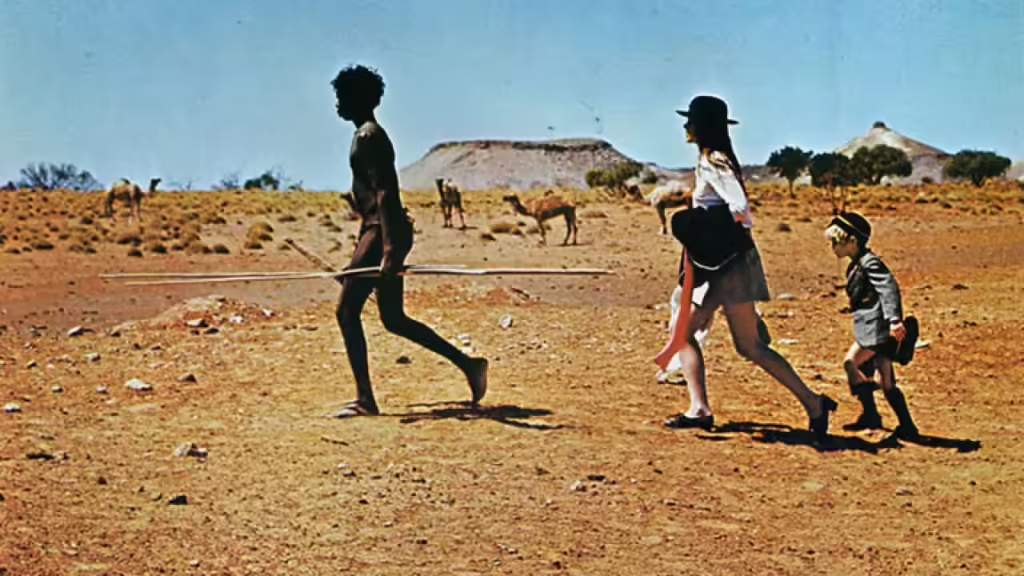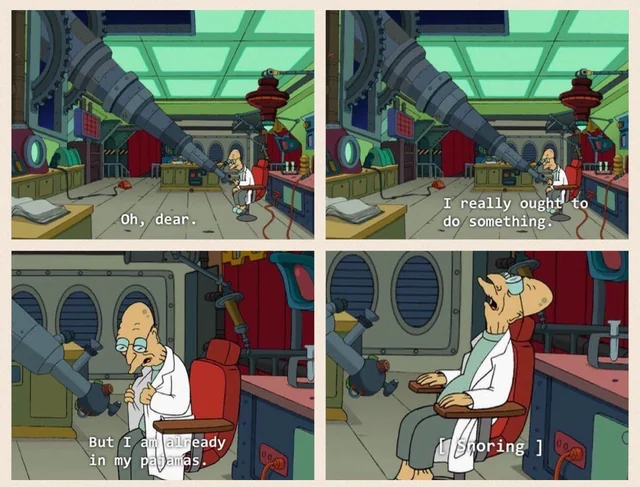Walkabout

From Vagabonding by Rolf Potts:
Culturally, the walkabout ritual is when Aborigines leave their work for a time and return to their native lifestyle in the outback.
On a broader and more mythical level, however, walkabout acts as a kind of remedy when the duties and obligations of life cause one to lose track of his or her true self.
To correct this, one merely leaves behind all possessions (except for survival essentials) and starts walking.
What’s intriguing about walkabout is that there’s no physical goal: It simply continues until one becomes whole again.
*
New Escapologist Issue 16, “Footloose and Fancy-Free,” is out now.
Contains Swearing
Are you satisfied by your job? Do you leap out of bed each morning with a song in your heart, eager to travel swiftly and painlessly to a fabulous workplace where the layout and technology are perfectly adapted to your goals and needs?
What of home life? Do you return from work each evening with time and energy to get stuck into your rewarding, creative projects? Do you have a good grasp of the sort of “home economics” mastered by your parents’ and grandparents’ generations?
If so, this book is not for you. If, on the other hand, your experience of the worker-consumer lifestyle is a screaming Hell of clueless, unsatisfying, underpaid, carcinogenic, insecure shambling that you never signed up for and is an affront to your years of difficult and expensive study, The Good Life for Wage Slaves might be the helpful volume–or at least the shoulder to cry on–you’ve been waiting for. It contains swearing. Also cats.
My 2020 book, The Good Life for Wage Slaves is enjoying a bit of a renaissance. Or at least a resurgence.
As well as an unexpected uptick in online sales, it seems to be a bestseller at Aye-Aye Books, my local bookshop. They’re flying out the door. Is there something afoot?
Why not get in on the inaction? Here’s where to grab a copy. (Or here if you’re a digimon).

Automated Roasting Jacks

Aw, who’s this little fella?
It’s the turnspit dog. Hiya, boy!
The turnspit dog used to help cook our dinners back in the pig-on-a-spit days of the over-an-open-flame times.
He helped by running in a wheel that kept the spit turning. Like this.
The turnspit dog went extinct when he was replaced by the arguably less cute automated roasting jack.
Makes you think, doesn’t it?
Look, I’m not saying that humans won’t or even shouldn’t be automated out of existence. But maybe we could start to think about building a world where our permission to live is no longer dependent on being useful.
*
Do something useless today and get yourself a copy of the all-new New Escapologist.
And That Is What I Did

I’ve been helping to edit and publish Before I Go, a new memoir by renegade comedian John Dowie.
He’s an Escapologist, tried and true. Early in the book he writes:
After nine months I decided that working for a living was not for me. Apart from the intolerable repetition of getting up at the same time every day, catching the same bus, arriving at the same building, seeing the same people, doing the same thing all day and then doing it all again tomorrow, I also had to endure having a boss – someone who told me what to do, where to be and when. As if my life was not my own. There had to be something better than this, but what?
Later, he writes this, which gives me goose pimples:
[In the late 1970s] there were three recognized routes into performing comedy. All were beyond me. I was not going to don a frilly shirt and perform in Northern nightclubs. I was not going to be a jolly Red or Bluecoat in a holiday camp. I was not going to go to Oxbridge, be in a revue and storm the Edinburgh Festival before conquering Broadway and/or the BBC. The only realistic choice I had was to follow the example set by the theatre groups I admired: to write, perform and tour a one-man show in venues similar to Birmingham Arts Lab. And that is what I did.
“And that is what I did…”
We’re used to hearing “and that is what I’ll do” inside our own heads. But here’s a man at the end of that journey, looking back on the decision and a life well lived.
“And that is what I did…”
*
Before I Go is due for release on August 25th, though a little bird tells me that pre-orders will be satisfied earlier than that. Here’s where to go for print and digital editions. You can also get his earlier memoir about a life on the road here (e-book only).
Woes Wanted

We have a column in New Escapologist called Workplace Woes. It’s an opportunity for readers to anonymously blow off steam about their jobs, past or present.
In Issue 14 there was the story of an office Halloween Party that went from embarrassing to worse. In Issue 16 there was the story of the boss who stalked his assistant so as to add an extra space after their full stops.
If you’d like to vent your spleen about this sort of workplace shit, please send me your Workplace Woes by email. All stories will be treated with utmost confidence. That’s the whole point.
Please keep them under 200 words (no need for elaborate scene setting: just cut right to the chase). Stories can be funny or anger-inducing or a little of both. It’s all good.
It’s always particularly nice to receive Woes from the worlds of retail or hospitality and also outdoorsy Woes (e.g. from farming or the construction industry), but if your story is simply office-based then that’s good too!
The deadline for Issue 17 is the end of August but any latecomers can be saved for future editions.
Thanks everyone. Over to you.
Letter to the Editor: We Don’t Need Amplification
To send a letter to the editor, simply write in. You’ll get a reply and we’ll anonymise any blogged version.

Friend R writes:
Hi Rob,
I thought you might be interested in what I’ve seen happening to abandoned offices in the last couple of years. Loads of them in Glasgow city centre are being used for the arts, which is great but it feels and looks very strange!
The brass band I’m in rehearses on the second floor of an office. We don’t need amplification, just space and nobody to complain about the noise, so it works really well for us. The same office hosts loads of other bands, some pottery people, some actual artists with clay and oils etc, crafty types and there’s something to do with protesting and foodbanks as we can see their tinned goods and flags neatly organised into piles in their bit.
It’s a weird atmosphere though, as we still have the strip lighting, the lanyard-operated entry gates, the grubby turquoise carpets, the unopenable windows with cream-coloured blinds and piles of adjustable office chairs and bits of desk stacked up in every corner.
Anyway, [the newsletter was a] great read as always, and hopefully catch up soon!
*
New Escapologist Issue 16 is now available in our online shop, in print and digital formats.
Choice and Control
From a decent article about Universal Basic Income (UBI) in the Observer today:
The only basic income pilot currently running in the UK is a Welsh government scheme for 600 young care leavers. Each is receiving £1,600 a month (£1,280 after tax), for 18 months, so that researchers can evaluate the scheme’s benefits. An interim report suggests recipients feel “a greater sense of choice and control over the future”.
Well yeah.
Having to scrounge and toil for the essentials of life is neither necessary or right. If society were better organised, none of the suffering inherent to the jobs system would exist. Instead, we’d have, as the article suggests, “choice and control.”
Choice and control! Natural gifts snatched from us by an unjust and increasingly rampant capitalism.
Give us the basics, oh leaders of the world, so we can once again have our choice and control. You are powerful and you are capable of granting us this meagre request. Give us the basics we require to live with dignity — by which I mean the ability to spend our days how we like — and we’ll never speak ill of your ugly orange asses again.
Or to put it more eloquently, Dr. Neil Howard at University of Bath says:
I think we need to be calling for basic income on the basis of a sense of shared morality, because economic insecurity is grim. It’s empirically damaging and it’s based on historical injustices that are translated into present inequalities. So there’s a very strong case for redistributive basic income right now, irrespective of whether or not the machines are coming.
Currently, we do not work because we love it; we work because we have to. This would change under UBI. Unwanted, unfair, badly-paid jobs would practically vanish overnight.
*
There’s No Law That Says You Must Work

Reader C sends us this quote from the commercial release of Richard Linklater’s Slacker script.
Slacker was an important antiwork film in the ’90s. As much as anything it created the “slacker culture” that gave us the Idler.
Anyway here’s the quote from director Richard Linklater:
Work isn’t mandatory in our society. There’s no law that says you must work. You can get by if you can do without. If you’re willing not to have […] a car, nice living conditions, nice clothes, and eat out every night; if you’re willing to go, “I just want to work part-time or not at all and spend most of my time making music, writing, reading, or watching movies,” you can consciously drop out. There’s still enough freedom left where you can manoeuvre.
Let’s pause for a second here to remember that the quote comes from 1992. It is more difficult now — not legally but economically and administratively — not to work. But it’s still very possible and what he says is still true.
By “nice living conditions” he presumably means expensive living conditions. I have nice living conditions — clean, easy, happy, centrally urban — on very little money. Friends in cheaply-built but expensive-to-rent housing do not, in my opinion, have “nice living conditions.” They’re a trap.
The freebies and hand-me-downs in this society are probably the best in the world. For example, I was never really a student at the University of Texas, but that’s a great facility. I’d get my library card for thirty bucks a year and have access to one of the bigger libraries in the South. Just being a citizen, you can take advantage of a lot of things in this culture.
This is still true. A public library card costs zero bucks. A university library, if they have a special reader pass or similar, still costs a similar amount to Linklater’s time. The best things in life are very low-cost or even free: walking, reading, being with people, playing music, writing, domestic futzing.
As the man says, “you can consciously drop out” because, truly, even 20 years later, there’s still no law demanding that you work and “still enough freedom left where you can manoeuvre.”
Elsewhere, in 1995, Linklater said:
I think the cheapest definition [of a slacker] would be someone who’s just lazy, hangin’ out, doing nothing. I’d like to change that to somebody who’s not doing what’s expected of them. Somebody who’s trying to live an interesting life, doing what they want to do, and if that takes time to find, so be it.
*
The brand new Issue 16 is available now in print and digital editions.
Letter to the Editor: Sabbatical
To send a letter to the editor, simply write in. You’ll get a reply and we’ll anonymise any blogged version.

Reader A writes:
Hi Robert,
Thought I’d share that I’ve finally managed to commence a controlled escape from wage slavery in the form of a 12-month sabbatical starting in October, from which I may or may not return. An ideal option for a ‘feartie’ like myself.
Both of your books have played no small part in different ways with the first opening my mind up to escaping as a realistic possibility that should be planned for, the second helping to devise tactics to endure my own Concrete Island whilst putting the plan into action. A massive thanks!
Love the new issues. [After reading the books,] there’s some added bonus in receiving the latest copies in the post to then take on the train for the dreary commute!
*
Feartie nothing. A sabbatical is an excellent and time-honoured escape route. There must be something in the water, actually. Another reader wrote to tell me about a 6-month sabbatical they’re taking, and a hard-working friend of mine in Leicester is taking a year off too. Long may it continue.
Maybe your sabbatical will contain the seed of a longer-term escape. Maybe, on a quiet night at the movies or under the stars, you’ll have the epiphany required to extend the break — either for a while or indefinitely. But it doesn’t have to be a gateway to greater things if you don’t want it to be or if that’s impractical. Let your sabbatical be its own adventure. Twelve months is a phenomenal result. Nice one.
Ode to a Dressing Gown
As many of my friends will know, I spend a lot of time in a dressing gown.
I fancy it’s Sherlock Holmes-ish but I’m probably just being a bum. Then again, so was he.
When people say things about wearing shirts and ties or Rosie the Riveter-style workwear at home to help them feel fresh or to be productive, I can’t relate to the sentiment at all.
Each to their own, but being able to wear a dressing gown all day is long one of the main advantages of not going to work.
A dressing gown is practically a friend for life. So far as I can remember, I’ve only ever had three:
1. an Aquafresh-striped one when I was a small boy.
2. an appropriately moody black one as a teenager, which was made of lovely pure cotton. It was probably my fave of the three, but as I grew the dressing gown did not. It soon has a Zapp Brannigan effect and had to be replaced for decency’s sake.
3. the one I have now.
The one I have now has big pockets, which means I can carry stuff around. At present, those pockets contain a handkerchief (as it always does), some anti-itch cream (I’m having an eczema time), a pencil, and an iPhone 6s.

*
The brand new Issue 16 is available now in print and digital editions.



